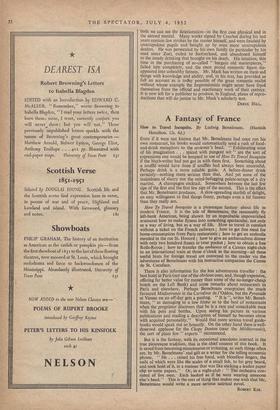A Fantasy of France
How to Travel Incognito. By Ludwig Bemelmans. (Hamish Hamilton. Its. 6d.)
EVEN if it were not known that Mr. Bemelmans had once run his own restaurant, his books would automatically send a rush of food- and-drink metaphors to the reviewer's head. " Exhilarating wine of his imagination . . . spiced with pungent wit " are the sort of expressions one would be tempted to use of How To Travel Incognito if the blurb-writer had not got in with them first. Something about a soufflé' would have done if souffles had always been successful. Perhaps drink is a more reliable guide. A before-dinner drink certainly—nothing more serious than that. And yet none of the insipidness of sherry nor the mind-befogging palate-scrape of a dry martini. A champagne cocktail. Somewhere between the last few sips of the first and the first few sips of the second. This is the effect that Mr. Bemelmans produces. A slow-spreading starfish of delight, an easy willingness to find things funny, perhaps even a bit funnier than they really are.
How To Travel Incognito is a picaresque fantasy about life in modern France. It is the tale of Bemelmans, the reasonably fly left-bank American, being shown by an improbable impoverished aristocrat how to make flyness into something spectacular, not only as a way of living, but as a way of life. How to travel in comfort without a ticket on the French railways ; how to get free meat for home-consumption from Paris restaurants ; how to get an umbrella mended in the rue St. Honore ; how to give an ambassadress dinner with only two hundred francs in your pocket ; how to obtain a free Rolls-Royce ; how to transfer the ambience of a Cannes night-club to an international train at three o'clock in the morning—all these useful hints for foreign travel are conveyed to the reader via the adventures of Bemelmans with his instructive companion the Comte de St. Cucuface.
There is also information for the less adventurous traveller : the best hotel in Paris (not one of the obvious ones, and, though expensive, offering far better value for money than some of the no-longer-cheap hotels on the Left Bank) and some remarks about restaurants in Paris and elsewhere. Perhaps Bemelmans overpraises the much favoured Mediterranee in the Carrefour de l'Odeon, but the Pyramide at Vienne on an off-day gets a pasting. " It is ", writes Mr. Bemel- mans, " as damaging to a low bistro as to the best of restaurants when the proprietor discovers that he is a rare and remarkable man with his pots and bottles. Upon seeing his picture in various publications and reading a description of himself he becomes obese with acquired personality." Would that more serious travel guide- books would speak out so honestly. On the other hand there is well- deserved applause for the Chope Danton (near the Mediteffanee), the sort of place few " experts " recommend.
But it is the fantasy, with its occasional anecdotes inserted in the true picaresque tradition, that is the chief content of this book. It is saved from becoming monotonous or irritating, as such things often are, by Mr. Bemelmans' real gift as a writer for the telling economic phrase. " He . . . raised his free hand, with bloodless fingers, the nailS of which were like the scales of a small fish, to his grey beard, and took hold of it, in a manner that was like sticking a leaden paper clip to some papers." Or, in a night-club : " The orchestra con- sisted of five men. Each looked as if he were wearing someone else's head." This is the sort of thing that makes one wish that Mr. Bemelmans would write a more serious satirical novel.
ROBERT KEE.


























































 Previous page
Previous page